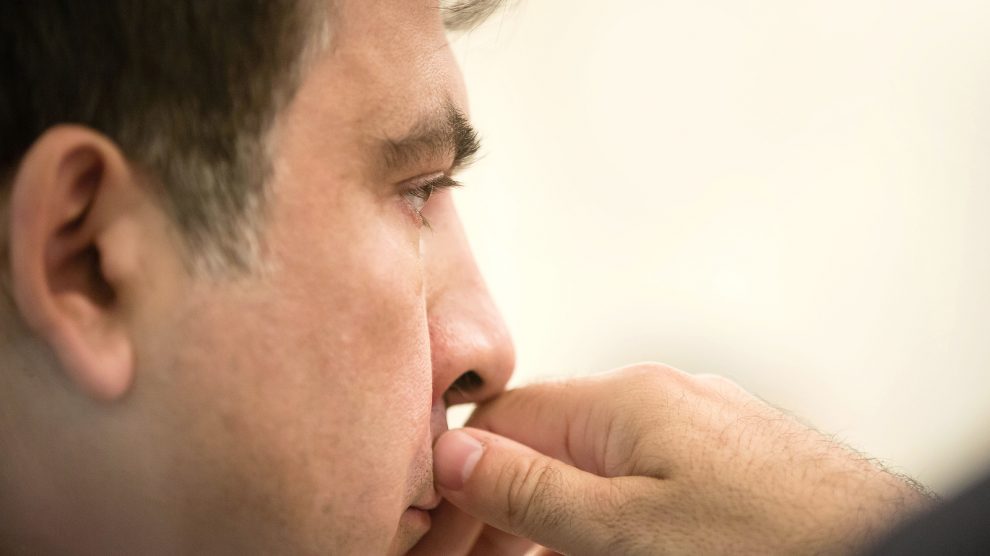Georgia’s government is refusing to transfer Mikheil Saakashvili, a former president now almost 50 days into a hunger strike, to a civilian hospital.
The condition of former Georgian President Mikheil Saakashvili, now on the 49th day of a hunger strike, is “critical”, according to Saakashvili’s official Twitter account and a team of doctors put together by Georgia’s ombudsperson Nino Lomjaria.
After examining Saakashvili on November 17, the medical team said that he faced a risk of “fatal complications” in the “immediate future”.
- What does Saakashvili’s homecoming mean for Georgian politics?
- Will Georgia’s democracy survive?
- Georgia’s Soviet-era cable cars are finally getting a makeover
Saakashvili, who served as the country’s president between 2004 and 2013, has been refusing food for ever since he was arrested on October 1, shortly after his return to Georgia from exile in Ukraine.
Georgia’s government has refused to move him from prison hospital to a civilian clinic, against the advice of doctors who have warned of the risk to Saakashvili’s life.
Georgia’s president, Salome Zurabishvili, who rarely criticises the country’s government, expressed concern for Saakashvili on November 17, adding that his “dignity” must be respected.
She was particularly critical of the release of a video showing Saakashvili’s transfer to a prison hospital, saying, “the release of that video footage, that insults his dignity and honour, is categorically unacceptable for me as president”.
“How we treat him, and how his dignity, health and safety are protected reflects on the image of our country,” she added.
While Zurabishvili also suggested that transferring Saakashvili to a civilian hospital would be problematic, she reminded the government that it had a duty to inform the public whether the hospital at the Gldani prison where he is being held meets international standards.
“If not, an alternative and safe solution [needs to be found],” she said, adding: “Although he made the decision to go on a hunger strike himself, this does not explain or diminish the responsibility of the government.”
On November 11, Saakashvili released a letter saying that he is ready to call off his hunger strike if taken to a civilian clinic for rehabilitation.
Saakashvili’s return
Saakashvili announced his return from exile shortly before Georgia held local elections on October 2. Few, at the time, believed he would do so: the former president had on several previous occasions failed to return despite publicly stating his intention to do so. He was sentenced in absentia to six years in prison in 2018 for “abuse of office” and the Georgian government had made it clear that he would be arrested on arrival.
On the morning of October 1, however, Saakashvili returned from Ukraine (a day earlier than advertised) hoping to make a political comeback in his homeland by leading the opposition movement to victory in the local elections.
He posted videos of himself in Batumi on the Black Sea coast, in which he urged his compatriots to vote for the United National Movement (UNM), the country’s largest opposition party which he founded and continues to, informally at least, lead.
Georgian law enforcement soon tracked Saakashvili down and detained him.
Earlier this week, the European Court of Human Rights ordered Georgia to ensure his safety, saying that the country’s government must take steps “to inform the court about the applicant’s current state of health, to ensure his safety in prison, and to provide him with appropriate medical care for the post-hunger-strike recovery period.”
The ruling is a so-called interim measure ordered by the Strasbourg-based court in urgent cases where the ECHR deems there is an imminent risk of irreparable harm to an applicant.
On Monday, Georgia’s prison service barred Saakashvili from attending his trial for embezzlement charges, saying it created a security risk. A week previously, he was also prevented from attending a hearing in a court case over his role in the violent dispersal of opposition protesters in November 2007.
If found guilty of the outstanding charges, several years could be added to the six-year sentence he received in 2018.
Several thousand supporters of Saakashvili and the UNM have protested in Tbilisi in recent days demanding he be transferred to a civilian hospital. More protests are expected this weekend.
Unlike many news and information platforms, Emerging Europe is free to read, and always will be. There is no paywall here. We are independent, not affiliated with nor representing any political party or business organisation. We want the very best for emerging Europe, nothing more, nothing less. Your support will help us continue to spread the word about this amazing region.
You can contribute here. Thank you.








Add Comment